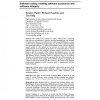Free Online Productivity Tools
i2Speak
i2Symbol
i2OCR
iTex2Img
iWeb2Print
iWeb2Shot
i2Type
iPdf2Split
iPdf2Merge
i2Bopomofo
i2Arabic
i2Style
i2Image
i2PDF
iLatex2Rtf
Sci2ools
122
Voted
IJCCBS
2010
2010
Software safety: relating software assurance and software integrity
: The overall safety integrity of a safety critical system, comprising both software and hardware, is typically specified quantitatively, e.g., in terms of failure rates. However, for software, it is widely accepted that there is a limit on what can be quantitatively demonstrated, e.g., by means of statistical testing and operational experience. To address this limitation, many software standards appeal instead to the quality of the process to assure the sufficient implementation of the software. In this paper, we contend that there is a large inductive gap between the quantitative software integrity required for a safety function and the assurance of the software development process for that function. We propose that this large inductive gap between software integrity and software process assurance could be narrowed down by an explicit definition of a product-based software argument. The role of this argument is to justify the transition from arguing about software integrity to arguin...
Related Content
| Added | 27 Jan 2011 |
| Updated | 27 Jan 2011 |
| Type | Journal |
| Year | 2010 |
| Where | IJCCBS |
| Authors | Ibrahim Habli, Richard Hawkins, Tim Kelly |
Comments (0)

